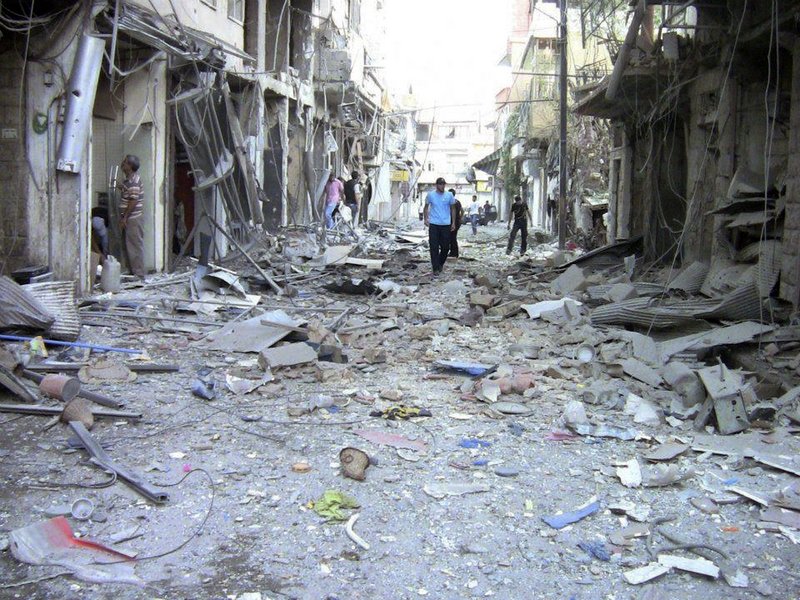– The Associated Press
DAMASCUS, Syria – Gunmen detonated back-to-back roadside bombs and clashed with police in central Damascus on Saturday in attacks that caused no damage but highlighted the ability of rebels to breach the intense security near President Bashar Assad’s power bases.
The apparently coordinated blasts point to the increasing use of guerrilla-style operations in the capital to undermine the government’s claims of having full control over Damascus. It also suggests that rebel cells have established a Damascus network capable of evading Assad’s intelligence agents and slipping through security.
Assad’s regime, however, has displayed no hesitation on the battlefield despite blows such as Damascus attacks and defections of high-ranking military and political figures, including the prime minister last week.
In Aleppo, activists said Syrian forces pressed ahead with an offensive to break rebel footholds in the nation’s largest city. The London-based Syrian Observatory for Human Rights said a helicopter gunship fired missiles on apartment buildings a day after protesters begged for international arms shipments.
With diplomatic efforts all but exhausted, strategic planning has moved into high gear for Assad’s possible fall or worst-case scenarios if the civil war deepens, including use of his suspected chemical arsenal.
In Istanbul, U.S. Secretary of State Hillary Clinton and Turkey’s foreign minister said their countries were creating a special joint task force to respond to potential crises such as chemical attacks or a spike in the more than 200,000 refugees that have already fled Syria.
“We have been closely coordinating over the course of this conflict, but now we need to get into the real details of such operational planning. It needs to be across both of our governments,” Clinton said after talks with Foreign Minister Ahmet Davutoglu.
Davutoglu hinted at the possibility of setting up a so-called “safe zone” inside Syria to protect war refugees from possible attacks.
The Arab League, meanwhile, announced that its foreign ministers will meet in an emergency session in Jiddah, Saudi Arabia, on Sunday to discuss the Syrian meltdown, which human rights groups say has claimed at least 20,000 lives. Some Arab states, led by Saudi Arabia and Qatar, are major rebel backers.
Syria’s security forces say they pushed the rebels from the capital after intense, weeklong battles last month. But opposition fighters appear resilient and resourceful in some areas.
Syrian forces pounded the capital’s suburb of al-Tal with mortars and artillery shells in the third consecutive day of government barrages, said Mohammed Saeed, an activist in al-Tal. He said they were using helicopters to strafe the area and two hospitals were hit.
“The situation is very grave and the town is completely besieged,” he said.
It came a day after armed men snatched three journalists from the pro-regime TV station Al-Ikhbariya and their drivers while they were covering the al-Tal violence. In June, gunmen raided Al-Ikhbariya’s headquarters, killing seven employees.
The bombings in Damascus brought chaos to some of the most exclusive areas of the capital in a symbolic blow to Assad.
One blast was set off by remote control as a vehicle carrying soldiers passed by in the Marjeh district, an official told The Associated Press.
The explosion was about 100 yards from the Four Seasons, one of the top luxury hotels in Damascus.
After the blast, gunmen opened fire on civilians “to provoke panic,” the state-run news agency SANA said.
At the same time, the second explosion went off near Tishrin Stadium, and hours later, a bus was attacked in a suburb, killing six passengers, SANA reported.
Send questions/comments to the editors.



Success. Please wait for the page to reload. If the page does not reload within 5 seconds, please refresh the page.
Enter your email and password to access comments.
Hi, to comment on stories you must . This profile is in addition to your subscription and website login.
Already have a commenting profile? .
Invalid username/password.
Please check your email to confirm and complete your registration.
Only subscribers are eligible to post comments. Please subscribe or login first for digital access. Here’s why.
Use the form below to reset your password. When you've submitted your account email, we will send an email with a reset code.